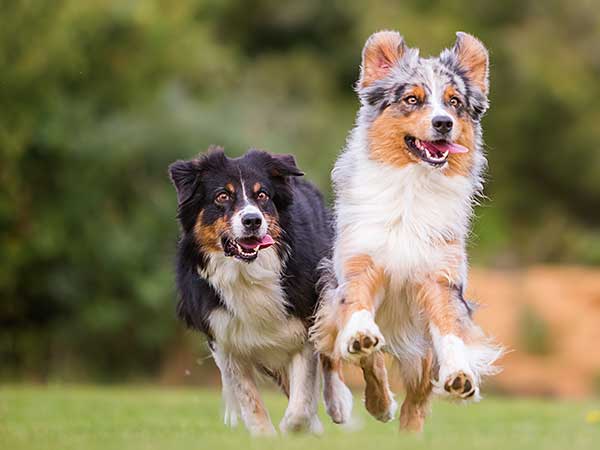
Obesity In Dogs: What You Need To Know
Fat dogs are often seen as cute or comical, but truth be known obesity is actually just as serious an issue for our four-legged friends as it is for we humans. Just as with people, excess weight gain can lead to a host of medical problems and can ultimately shorten lifespan dramatically. When you consider that currently between 25-30% of the canine population is overweight, you can begin to understand just how much of an issue this really is.
It may seem as if this wouldn't be much of a problem for energetic, working breeds like the Australian Shepherd but you would be surprised. The truth is that obesity in dogs can strike across all breeds and all ages, so it is something that all owners need to be aware of and on the alert for.
So how can you determine if your dog is actually overweight? The easiest way is by measuring rib coverage. In a dog of healthy weight, you should be able to feel the ribs just below the fur. In fat dogs, the ribs become much harder to feel. Your vet will have other ways to make a more thorough assessment, but this is a good first step that you can do at home.
Generally speaking, obesity in dogs is defined as being 20% or more above their ideal body weight. Dogs that are 10-20% above their ideal weight are considered overweight. Either condition is a concern as it can leave dogs open to diabetes, heart disease, joint issues and even some forms of cancer.
In some cases, obesity may be caused by an underlying problem such as thyroid disease but in other cases, it is simply a combination of overeating and not getting enough exercise.

Christian Müller / stock.adobe.com
Australian Shepherds are not known for being couch potatoes. However, other factors can contribute to obesity in dogs and a trip to the vet will help you eliminate potential medical causes.
What Can Be Done To Help Fat Dogs Lose Weight?
So what can be done for fat dogs? As with their human counterparts, there is no miracle solution for losing weight. It all comes down to burning more calories than you eat, which of course means controlling your dog's diet and making sure that he gets enough regular exercise. However, controlling his diet does not simply mean feeding him less. In fact, just cutting back on portions could actually do more harm than good as it could lead to malnutrition.
If weight gain is an issue for your dog you should speak to your vet about an appropriate diet. The vet can make suggestions about how much and how often to feed your dog. In general, the healthiest weight loss diet is one that elimnates poor quality ingredients and fillers. There are many products currently on the market that are scientifically formulated to help control weight gain and fight obesity in dogs and your vet will be able to recommend the best ones to use.
At the same time, it is important for your dog to get plenty of exercise. In most cases, vets recommend at least 15 minutes of leash walking twice a day and periods of rigorous play. This should be less of a problem for energetic Aussies, who love to run, and run, and run. Either way, however, it is imperative that fat dogs get up and moving as much as possible to burn off those excess calories.
Any way you look at it, obesity in dogs is a serious issue, but with a little vigilance, it can be easily controlled so that your dog can lead a long, happy life. So if you're worried that your pup is overweight, talk to your vet today and get him back on the road to good health.
Have Dog Training Questions?
Check out these introductory dog training videos...
I want my dog to stop being aggressive.
I want some help training my new puppy.
I want my dog to stop barking at everything.
Get Australian Shepherd Info, Website Updates, Special Offers, and Cartoons...
FREE GIFT
You'll also receive a free copy of the ebook
My Everyday Dog Training Tools
by professional dog trainer Daniel Abdelnoor, "Doggy Dan"










 Loading Image...
Loading Image...